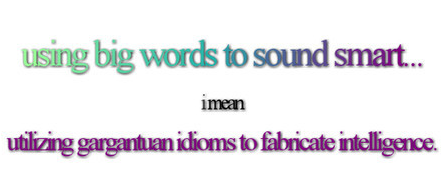The difference between the right word and the almost right word is the difference between lightning and lightning bug.
Mark Twain
I only remember three things about my eighth grade music teacher: he had a ponytail, he made a tremendous amount of noise when our pitiful orchestra failed to flawlessly produce a Baroque concerto series, and he taught us the phrase, "Say What You Mean, and Mean What You Say."
I tucked that phrase away in my mind, marveling several times over at its simplicity and truth.
Even now I repeat those words to myself when I want a reminder to consider the content, form, and intent of what I am writing or saying.
Students can also use this phrase as an entry point into clear, effective communication. When others understand you, they are more inclined to believe you know what you are talking about. Or, to put it plainly, the better you are at saying what you mean and meaning what you say, the more likely others will consider you an intelligent person. So how do you make yourself understood?
I tucked that phrase away in my mind, marveling several times over at its simplicity and truth.
Even now I repeat those words to myself when I want a reminder to consider the content, form, and intent of what I am writing or saying.
Students can also use this phrase as an entry point into clear, effective communication. When others understand you, they are more inclined to believe you know what you are talking about. Or, to put it plainly, the better you are at saying what you mean and meaning what you say, the more likely others will consider you an intelligent person. So how do you make yourself understood?
It has often been said there’s so much to be read, you never can cram all those words in your head. So the writer who breeds more words than he needs is making a chore for the reader who reads. That is why my belief is the briefer the brief is, the greater the sigh of the reader’s relief is.
Dr. Seuss
Consider the following three scenarios:
The common denominator in the above scenarios is feeling talked over, and, as a result, not understanding what an author, instructor, or classmate is trying to communicate to others. You feel dumb, perhaps, but it is also common to dismiss the speaker as "stupid" because of his or her failure to communicate clearly. Inevitably you disengage from the task or discussion at hand.
Talked Over >>> Failure to Understand >>> Unintelligent
But did you also notice that by reversing this (admittedly simplified) formula, there is also the rule for making everybody think you are smart?
Talking With >>> Easy to Understand >>> Intelligent
Think about it: when people are able to break down complex ideas and theories into digestible chunks of information, we consider them smart. Comparatively, it is much easier to reject someone who is going on and on about something that feels inaccessible as stupid, dumb, or just plain crazy.
For students this means stop worrying about using the longest word dictionary.com spits back out at you when you google "synonym for explain."
More students end up accidentally choosing a synonym that is somewhat related but irrelevant for their discussion, and end up writing something like, "The author vindicates the living habits of 19th century American pioneers."
But no, the author probably wasn't trying to justify or excuse the living habits of pioneers, as has accidentally been suggested. So just use "explain."
- You are struggling to get through a dense passage in an impossibly difficult book. Despite re-reading the same paragraph three times, you still have no idea what the author is talking about.
- Your instructor's exam question is so confusing, you aren't sure how to begin answering. Even though you studied for hours and felt prepared, you are now worried that you are going to bomb the test.
- Your annoying classmate has been talking for over 5 minutes, barreling on with some sort of impromptu soliloquy about the reading. She is dropping philosophers' names and big words with wild abandon, almost enjoying that nobody understands what the heck she is talking about.
The common denominator in the above scenarios is feeling talked over, and, as a result, not understanding what an author, instructor, or classmate is trying to communicate to others. You feel dumb, perhaps, but it is also common to dismiss the speaker as "stupid" because of his or her failure to communicate clearly. Inevitably you disengage from the task or discussion at hand.
Talked Over >>> Failure to Understand >>> Unintelligent
But did you also notice that by reversing this (admittedly simplified) formula, there is also the rule for making everybody think you are smart?
Talking With >>> Easy to Understand >>> Intelligent
Think about it: when people are able to break down complex ideas and theories into digestible chunks of information, we consider them smart. Comparatively, it is much easier to reject someone who is going on and on about something that feels inaccessible as stupid, dumb, or just plain crazy.
For students this means stop worrying about using the longest word dictionary.com spits back out at you when you google "synonym for explain."
More students end up accidentally choosing a synonym that is somewhat related but irrelevant for their discussion, and end up writing something like, "The author vindicates the living habits of 19th century American pioneers."
But no, the author probably wasn't trying to justify or excuse the living habits of pioneers, as has accidentally been suggested. So just use "explain."
To talk well and eloquently is a very great art, but that an equally great one is to know the right moment to stop.
Wolfgang Amadeus Mozart
You can use the fanciest words, take liberties with syntax, and defy grammatical rules to craft what you think is elegant, elevated-sounding prose.
But if you want to be understood, and consequently, impress others with your knowledge, focus instead on being precise with word choice, organizing the information in a coherent and logical manner, making clear your thesis and supporting points, and skipping the fluff and filler in favor of succinct, tightly-written paper or spoken argument.
Say what you mean, mean what you say, and leave it at that.
But if you want to be understood, and consequently, impress others with your knowledge, focus instead on being precise with word choice, organizing the information in a coherent and logical manner, making clear your thesis and supporting points, and skipping the fluff and filler in favor of succinct, tightly-written paper or spoken argument.
Say what you mean, mean what you say, and leave it at that.
This post is part of the Link-Up hosted by Home Stories A-Z!




